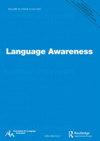通过显性拼写指导促进英语阅读障碍学习者的母语正向迁移:一项干预研究
IF 2.2
2区 文学
0 LANGUAGE & LINGUISTICS
引用次数: 4
摘要
越来越多的证据表明,阅读障碍可能涉及内隐学习困难,这可能会阻碍阅读障碍学习者通过内隐教学获得外语拼写技能。矛盾的是,这正是有阅读障碍的荷兰学生在学校学习英语拼写的方式。本研究旨在通过对母语荷兰语和第二语言英语拼写的直接比较,确定实施显性拼写指导是否有助于阅读障碍学习者在学习英语时拼写技能的发展。参与者是40名独立诊断患有阅读障碍的荷兰语中学生(12-14岁)。20名参与者参加常规英语课程(对照组),而另外20名参与者每周接受一次明确的对比拼写指导,持续八周(干预组)。结果显示,干预组在干预的8周内拼写技能的发展速度快于对照组,干预后5周仍保持在同一水平。这些发现表明,即使是基于明确的拼写规则指导和跨语言比较的相对较短的干预,也会对有外语阅读障碍的学生的拼写技能发展产生促进作用。本文章由计算机程序翻译,如有差异,请以英文原文为准。
Facilitating positive L1 transfer through explicit spelling instruction for EFL learners with dyslexia: an intervention study
Abstract There is growing evidence that dyslexia may involve difficulty with implicit learning, which may hinder learners with dyslexia to acquire spelling skills in a foreign language through implicit instruction. Paradoxically, this is exactly how Dutch students with dyslexia learn English spelling at school. This research aims to determine if implementing explicit spelling instruction, based on a direct comparison between L1 Dutch and L2 English spelling, facilitates the development of spelling skills of dyslexic learners in English as a Foreign Language. The participants were 40 Dutch-speaking secondary-school students independently diagnosed with dyslexia (age 12–14). Twenty participants attended their regular English lessons (comparison group), whereas 20 other participants received explicit contrastive spelling instruction once a week for eight weeks (intervention group). The results reveal that during the eight weeks of the intervention spelling skills of the intervention group developed faster than those of the control group, and they remained at the same level five weeks after the intervention. These findings suggest that even a relatively short intervention based on explicit instruction of spelling rules and cross-linguistic comparisons has a facilitative effect on the development of spelling skills of students with dyslexia in a foreign language.
求助全文
通过发布文献求助,成功后即可免费获取论文全文。
去求助
来源期刊

Language Awareness
Multiple-
CiteScore
3.70
自引率
10.00%
发文量
18
期刊介绍:
Language Awareness encourages and disseminates work which explores the following: the role of explicit knowledge about language in the process of language learning; the role that such explicit knowledge about language plays in language teaching and how such knowledge can best be mediated by teachers; the role of explicit knowledge about language in language use: e.g. sensitivity to bias in language, manipulative aspects of language, literary use of language. It is also a goal of Language Awareness to encourage the establishment of bridges between the language sciences and other disciplines within or outside educational contexts.
 求助内容:
求助内容: 应助结果提醒方式:
应助结果提醒方式:


